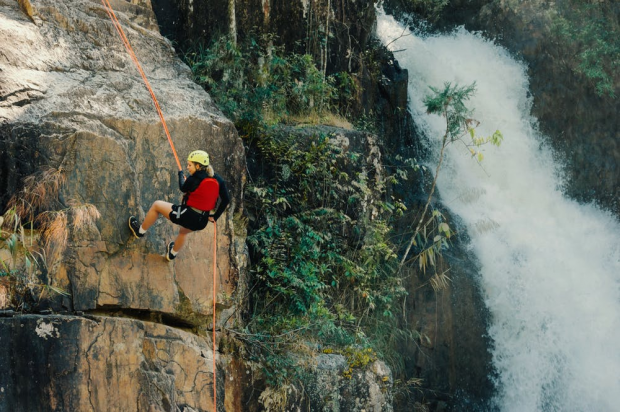How To Get Better At Rock Climbing: A Noob’s Guide
A newcomer to rock climbing is often unprepared for the physical, emotional, and technical challenges it presents. This article will cover some major pitfalls of new climbers, with tips on how to avoid them. Everyone was once a noob, and this article will help to make new climbers excellent and guide the veterans in improvement.

Focus on grip strength
This is one of the major pitfalls of new climbers. Newcomers are eager to climb but have no clue how important grip strength is. For 90% of climbing problems, you want to be able to hang on for dear life and figure out the next move. If your fingers are raw after a night at the crag, then you likely had a poor evening of training or preparation before that day. The grip strength for climbing is the most essential, so any time you have a choice, training your grip should be chosen over other exercises. A beginner’s fingers might not be able to handle the type of pull-ups used by professionals for training, but they can try doing dead hangs or changing grips regularly while climbing.
Bouldering is important
Here is another common mistake for new climbers. Bouldering, or climbing low to the ground without a rope, is one of the best forms of training. It is low risk, so it can be done in large amounts with confidence. The holds are often smaller and more plentiful on bouldering walls than real rock faces. Most importantly, the lack of a rope means that much bolder moves may be attempted than when tied into a line that will catch you if you fall. If you are not bouldering regularly at all, you are missing out on some major performance gains simply because there are no ropes to hold back your potential.
Listen to your coach
Forget about ego, and pay attention to someone who has more experience than you. You will likely find that climbers are much friendlier than any other sport, with eagerness to help newcomers improve their climbing lives. These coaches are there for a reason, and it is usually because they love the sport and want everyone to reap its benefits. There is no glory in “coaching”, so take what they say at face value; always consider whether this advice fits your style of climbing. Remember that practice makes perfect, so feel free to ask why something was suggested if needed!

Diet/Sleep
You cannot expect good physical performance when you have had poor nutrition or sleep the night before. It seems obvious, but many climbers neglect to realize the importance of diet and sleep before heading out. Climbing involves arm strength, finger power, endurance, balance, and mental determination. You can train all you want in order to get stronger, but if your body is tired then you are just getting weaker with each move up the wall. Eating well supplies needed nutrients to fuel your body for training/climbing sessions; it also allows the muscles time to repair themselves, so gains can be made in subsequent sessions. Sleep gives your muscles a chance to recuperate before the next day’s session starts.
Buy shoes that fit
A common mistake made by new climbers is to buy the shoes at their local sporting goods store. These shoes are likely designed for people who climb infrequently and lack the proper support required for long-term wear. This causes pain to shoot up the arms after excessive climbing sessions during which time these shoes are worn. Climbing shoe manufacturers design specific models of shoes according to the type of foot you have, whether it has high arches or low ones (or none!). Trying on more than one pair of shoes is highly encouraged; find the model that best suits your foot shape rather than settling on an ill-fitting shoe.
Poor technique
Everyone has seen experienced climbers make strange body movements in order to advance upwards. These climbers have likely been taught these techniques by a more experienced climber, and have practiced them until they become second nature. Learning new techniques is essential to becoming a better climber because it allows you to be more efficient when scaling rock faces. There are many gymnastic-like movements in climbing which require practice and patience but will offer tremendous rewards when perfected over time.
Rock climbing is a fantastic sport, and becoming better at it is not as difficult as most people think. It takes time and patience to progress from novice, to intermediate or advanced levels. However, all this effort will pay off when you reach your goals! There is no harm in getting started with the basics so that you can enjoy climbing for many years to come.
